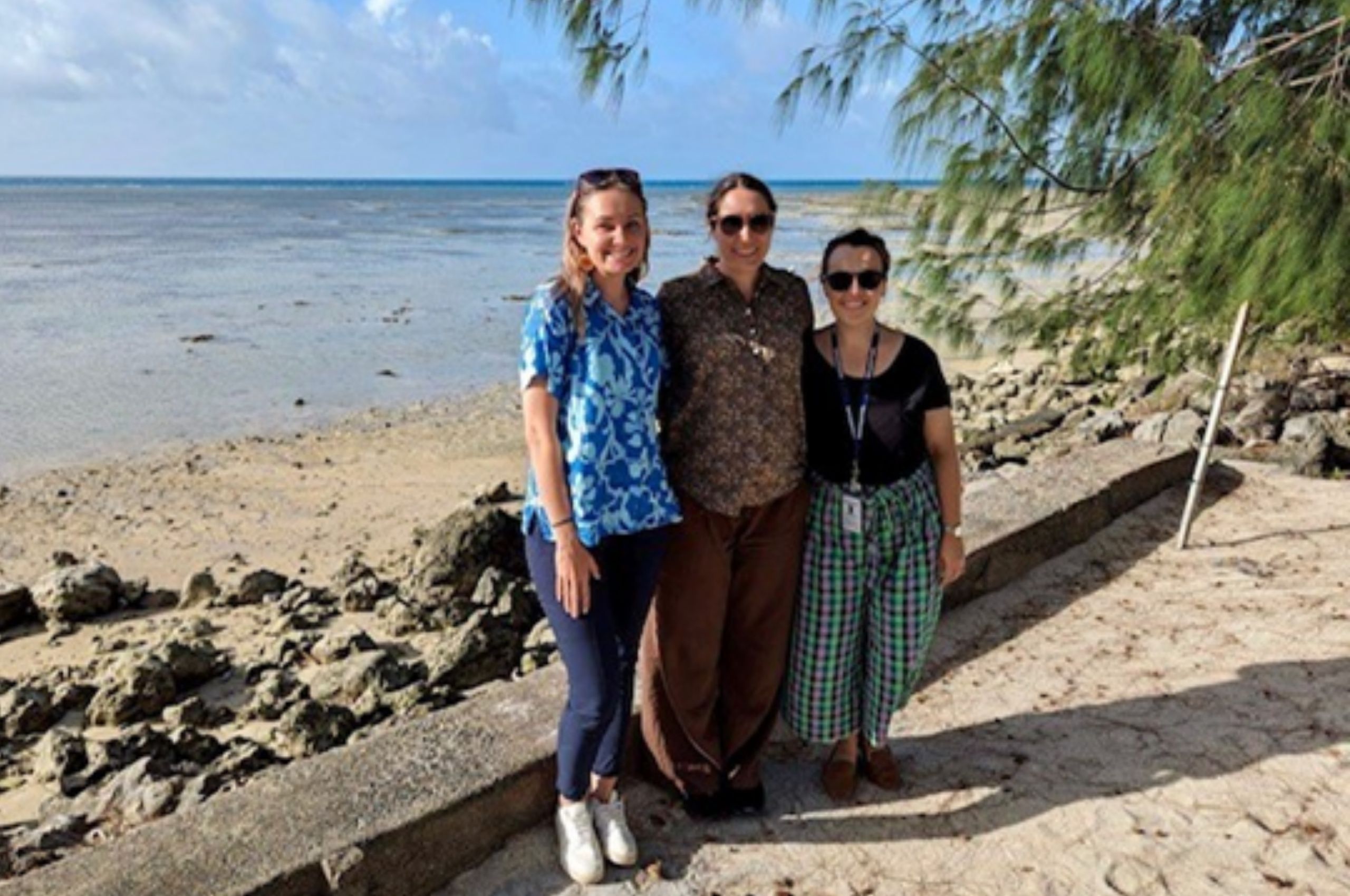Training Programs
We translate our research into practice through education and training.

The Social Attention and Communication Surveillance (SACS) Assessment Training
Our Principal Research Fellow, Associate Professor Josephine Barbaro, has been working on the early signs of autism in babies and toddlers for more than 18 years and has recently extended the checks for up to preschool age. The SACS method identifies a set of behaviours or 'early signs' that are characteristic of Autistic children from as young as 11 months old. Originally implemented in Victoria's Maternal and Child Health services, more than 15 countries now use the SACS method.
A growing number of health professionals across Cape York and the Torres Strait are now trained in the SACS tool, supporting earlier identification of autism in some of Queensland’s most remote communities. Torres and Cape Hospital and Health Service staff members Imogen Armstrong, Sarah McGuire and Annalise Mundy (pictured L-R ) have all completed the SACS-R+PR training.
SACS Training options:
SACS-R+PR training equips professionals working with children under 60 months of age with the necessary skills to effectively identify Autistic children, discuss their findings with families as part of routine care and provide a streamlined referral pathway for families.
The videos in this online module were recorded during a recent face-to-face workshop. We have included additional resources to support your knowledge and practice. This module includes additional readings and articles that are located within each section. These are available for you to download and keep as a resource.
| Format | Self-paced online, available 24/7 |
Access Period | 12 months |
Cost | $599.00 (ex. GST) |
Annual fee* | $59.00 (ex. GST) |
*The Annual Certification Fee is $59 AUD (excluding GST). This fee grants access to course materials, use of the SACS Checklists, and extends the validity of your certificate for an additional year. This cost can either be covered by the institution an individual is working at, or the individual themselves, if they choose to leave the institution and want to continue using the SACS. | |
MODULESModule 1: Neurodiversity | WHAT WILL I LEARN?
|
SUITABLE FOR:
Psychologists, Early Childhood educators, Allied Health Professionals, Maternal and Child Health Nurses.
For larger groups that want to be trained in the Social Attention and Communication Surveillance-Revised (SACS-R) and SACS-Preschool Training (SACS-PR). This training course can be delivered over multiple days depending on the size of the group.
MODULES
Module 1: Neurodiversity
Module 2: Introduction
Module 3: Foundation
Module 4: Part 1: Social Attention and Communication Study (SACS)
Module 5: Part 2: Social Attention and Communication Study (SACS)
Module 6: Videos Examining the Signs of autism in Preschoolers
Module 7: Videos Showing Typically Developing Child on the SACS Items
Module 8: How to use the SACS Checklists
Module 9: Discussing MoSAIC with Parents and Caregivers
Module 10: Referral Pathways
SUITABLE FOR:
Government agencies, Clinics with multiple sites, Psychologists, Early Childhood educators, Allied Health Professionals.
Terms and conditions
This comprehensive training module developed for Victorian Maternal and Child Health Nurses contains:
- Narrated slides recorded at a recent face-to-face workshop
- Additional notes and resources on each of the topic areas
- Videos of children with and without autism
- Downloadable resource sheets, brochures and additional readings.
How to complete the module
Detailed information is provided in the training home page. Please read through the instructions.
Certificates of Completion
Certificates of completion will be sent via email after the completion of the training module.
To access the module
Your username and password have been sent to via email.
Unless you have changed it, your username is most often your work or student email.
Support: sacs.training@latrobe.edu.au
For overseas participants only, We offer a SACS-R+PR Master trainer program that enables approved individuals and institutions to provide training to their staff. Please contact us for an informal discussion about whether this program could be suitable for your international organisation.
If you are from Australia or New Zealand please see our SACS-R+PR online and Teams & Groups options.

Supporting a Neurodiverse Workforce
Specialised workplace training created to close the gap in existing mental health training, tools, and processes in the workplace, by being explicitly designed to support Autistic employees. Designed in collaboration with Olga Tennison Autism Research Centre, DXC, ANZ Banking Corporation and Untapped.

The ‘Supporting a Neurodiverse Workforce: A Mental Health and Wellbeing Online Training Course’ presents current, evidence-based information, and strategies about mental health and wellbeing for Autistic individuals.
A world first online training course designed to support the mental health and wellbeing of all employees including Autistic employees.
Content is available for executives, supervisors, mentors, co-workers AND Autistic employees.
By completing this 11-module training course you will learn:
- The importance of supporting well-being in the workplace
- What Autism is, and how to create Autism friendly environments
- How to recognise mental ill health more broadly as well as for those who are Autistic
- Strategies to support the mental health of yourself, your colleagues, or your Autistic employees.
This training is based on the evidence-based content developed for the Supporting a Neurodiverse Workforce: A mental health and well-being resource and training package" project. It was developed with generous support from DXC Technology and ANZ Bank in partnership with OTARC.

Understanding and Support for Autism – undergraduate single subject
This 12-week undergraduate subject aims to give students a contemporary understanding of autism that reflects both changing community attitudes and advances in knowledge.
Students will consider the different presentations of autism, Autistic people's lived experiences, and the different support needs of Autistic people and their families across the lifespan – from very early infancy, through childhood and adolescence, and into adulthood. Offered through Open Universities Australia, this subject does not require an ATAR or enrolment in a degree. The subject coordinator is OTARC’s Dr Melissa Gilbert.
